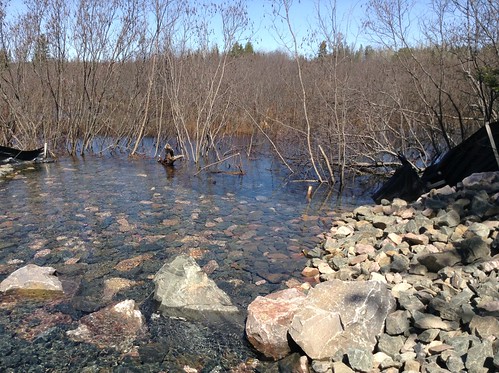FOR IMMEDIATE RELEASE
Save the Wild U.P. petitions EPA’s Environmental Appeals Board
MARQUETTE — Grassroots environmental group Save the Wild U.P. (SWUP) recently petitioned the Environmental Protection Agency’s (EPA) Environmental Appeals Board (EAB), appealing the Michigan Department of Environmental Quality’s (MDEQ) reissuance of a Groundwater Discharge Permit (GWDP) for the Eagle Mine.
The Environmental Appeals Board is the final authority on appeals pertaining to all major environmental statutes which the EPA administers. It is an impartial body, independent of the EPA. According to Save the Wild U.P.’s interim director, Alexandra Maxwell, “Our petition is on the EAB’s docket. While we don’t know what the outcome will be, we know, without a doubt, that we submitted an accurate, urgent, and thoughtful petition on behalf of our supporters — on behalf of the Lake Superior watershed. We’re very hopeful that the EAB will review the permit decision, and uphold the Clean Water Act.”
Save the Wild U.P.’s central argument in the petition explains that the GWDP is the wrong regulatory permit for Eagle Mine’s wastewater discharges. “Permit conditions set for effluent discharge fail to protect surface water. The Petitioner requests that the EPA require Eagle Mine to obtain a Clean Water Act permit or require EPA to do so, with limits sufficiently protective of the identified groundwater-surface water interface, including aquatic life, fish and wildlife dependant upon the health of freshwater springs, the Salmon Trout River, and Lake Superior.” By design, a groundwater discharge permit is not designed to be protective of surface water. Surface water standards were created to keep macroinvertebrates and sensitive aquatic ecosystems safe from dangerous levels of metals, pH and salts.
“A groundwater discharge permit is the wrong tool with which to regulate this discharge. It is undisputed that the water leaving the mine ultimately ends up in springs and rivers and Lake Superior. The permit needed is a Clean Water Act permit, designed to protect aquatic life,” said attorney Michelle Halley, who has worked extensively on Eagle Mine issues.
After a comprehensive permit review, Save the Wild U.P. concluded that the current GWD permit was issued under “erroneous findings of fact and erroneous conclusions of law” and the group has appealed the MDEQ’s permitting decision, on behalf of their Board, Advisory Board and supporters.
“From the beginning, Eagle Mine’s Groundwater Discharge Permit was based on a false premise, the idea that groundwater does not become surface water. Eagle Mine has relied on half-truths and unknowns concerning the hydrology of the Yellow Dog Plains,” explains Kathleen Heideman, SWUP president. “Proper regulation cannot exist without accurate science and hands-on, comprehensive knowledge of the environment. We know what’s at stake — nothing less than our clean water.”
On May 7, 2015, Save the Wild U.P. also sent a letter to the EPA’s Regional Administrator, Dr. Susan Hedman, asking that Region 5 exercise their veto authority over the National Pollution Discharge Elimination Systems Permit (NPDES) recently reissued for Lundin’s Humboldt Mill facility. SWUP’s request enumerated critical concerns regarding the the NPDES permit, especially the authorization of a second discharge point, “Outfall 002”, which allows a “degradation” of water quality in the Middle Branch of the Escanaba River (MBER), and which was constructed without an Environmental Impact Assessment for the area where the discharges are being released.
“I find it outrageous that MDEQ and Eagle Mine failed to consider the environmental impacts of increased discharges authorized by this permit,” said Heideman. “No baseline information was provided, either for the wetland or the Middle Branch of the Escanaba River. Eagle Mine’s original permit failed to evaluate these sites, and now they want to dump wastewater into unassessed ecosystems.”
Founded in 2004, Save the Wild U.P. is a grassroots environmental organization dedicated to preserving the Upper Peninsula of Michigan’s unique cultural and environmental resources. For more information contact info@savethewildup.org or call (906) 662-9987. Get involved with SWUP’s work at savethewildup.orgor follow SWUP on Facebook at facebook.com/savethewildup or Twitter @savethewildup.

